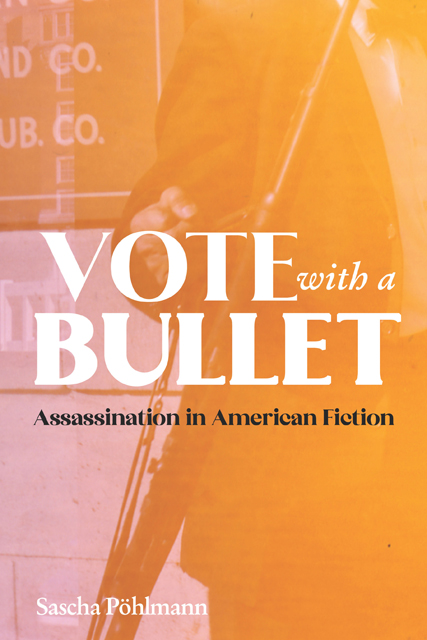Book contents
- Frontmatter
- Dedication
- Contents
- Introduction: The Individual and Society
- 1 The Princess Casamassima (1886)
- 2 The Assassination Bureau, Ltd. (1910/63)
- 3 All the King’s Men (1946)
- 4 Solar Lottery (1955)
- 5 The Manchurian Candidate (1959)
- 6 The Parallax View (1970)
- 7 Libra (1988)
- 8 The Dead Zone (1979)
- 9 11/22/63 (2011)
- 10 Big If (2002)
- 11 Checkpoint (2004)
- 12 The Good Father (2012)
- Conclusion
- Works Cited
- Index
11 - Checkpoint (2004)
Published online by Cambridge University Press: 14 January 2023
- Frontmatter
- Dedication
- Contents
- Introduction: The Individual and Society
- 1 The Princess Casamassima (1886)
- 2 The Assassination Bureau, Ltd. (1910/63)
- 3 All the King’s Men (1946)
- 4 Solar Lottery (1955)
- 5 The Manchurian Candidate (1959)
- 6 The Parallax View (1970)
- 7 Libra (1988)
- 8 The Dead Zone (1979)
- 9 11/22/63 (2011)
- 10 Big If (2002)
- 11 Checkpoint (2004)
- 12 The Good Father (2012)
- Conclusion
- Works Cited
- Index
Summary
A similar dialectic of despair and empowerment to the one that is operative in Big If is the motivational force in Nicholson Baker’s Checkpoint: A Novel. A modestly controversial publication in its time, Checkpoint is the text among those selected here that most immediately responds to its historical moment and political context, the presidency of George W. Bush and the unjust violence inflicted on and in various regions of the world after 9/11. The text is philosophically weighed down by this particularity, and it seems to trade aesthetics for politics without much of an interest in connecting the two, so that its relevance may lie more in its statement than in how it makes that statement. Yet at the same time the most interesting aspect about Checkpoint may well be its very inability or refusal to transcend its particular historical moment, going for a deliberate knee-jerk rawness that does not really care for consistency and thereby manages to convey (and question) an angry irrationality that many of the other texts treated here are lacking.
The novel takes the form of a dramatic dialogue, but without stage directions it is more of a philosophical dialogue in the Socratic tradition than a dramatic text that is meant to be produced. Its textual rather than dramatic nature is highlighted from the start when Jay and Ben, the two interlocutors, begin their conversation by testing their recording device, the narrative conceit being that readers are getting a transcript rather than witnessing anything directly. This results in a conflation of temporalities: while the conversation unfolds in the present tense, we are only reading it after the fact, and this leaves us wondering more about the consequences of their meeting (and about the reasons why the transcript might be available to us). The scene is set by the only external commentary in the text—“May 2004 / Adele Hotel and Suites / Washington, D.C.”—and other than that there are only parenthetical references to sounds on the tapes that are part of the transcription.
Without any narrative framework, Checkpoint focuses only on the voices of Ben and Jay. While their subjective perspectives, opinions, and ideologies are commented on by the respective other, they are not embedded in any broader context that would further elucidate them for the readers.
- Type
- Chapter
- Information
- Vote with a BulletAssassination in American Fiction, pp. 155 - 164Publisher: Boydell & BrewerPrint publication year: 2021

